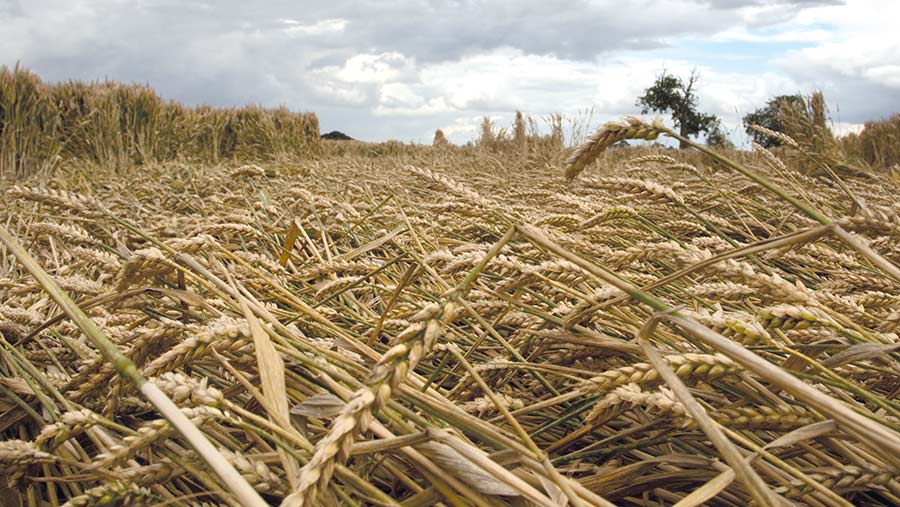A guide to the new Recommended List lodging scores
 © Tim Scrivener
© Tim Scrivener Tweaks to the AHDB Recommended List are helping growers get a better handle on the lodging risk from the different cereal variety options for drilling this autumn.
There had been suspicions that over the years the lodging ratings were becoming more similar, explains AHDB field trials lead analyst Ellie Marshall.
“We were not seeing much diversity across the ratings,” she says.
See also: How to prevent spring barley lodging
Lodging ratings across varieties were contracting year-on-year, showing little discrimination between each variety.
“But there was no evidence that this was what was actually happening in the field,” she says.
Another illustration of the shortcoming was that even with zero lodging, it wasn’t possible to get a rating of 9 (the highest on the 1-9 scale), she says.
New calculation
So the AHDB set out to change the calculations to pull out the varietal differences more and add diversity back into the ratings.
A key change has been the addition of resistant and susceptible fixed points on the regression slope, as is done with the disease ratings.
This means zero lodging will generate a 9 rating and the lower end of the scale will represent higher incidences of varietal lodging in a consistent way.
This has allowed the rating to stretch out at both ends of the scale, showing more discrimination between varieties.
The change has been implemented for all cereal varieties on the current (2022-23) Recommended Lists.
This has led to changes in ratings for some varieties. “This is due to the re-setting of the scale rather than any change in lodging susceptibility,” Ms Marshall stresses.
For example, Fusion oats, which has good standing power, previously scored 8 (2021-22 Recommended Lists) for lodging and now has a 9 score in the 2022-23 lists.
Example changes to lodging scores |
||
|
|
Rating in 2021-22 Recommended List |
Rating in 2022-23 Recommended List |
|
Winter wheat – Skyscraper |
7 |
6 |
|
Winter barley – Thunderbolt |
6 |
5 |
|
Winter oats – Fusion |
8 |
9 |
For wheat and barley, lodging is also expressed as a percentage for each variety.
For example, growers looking for a soft group 4 will see a lodging score range from 1% (Swallow) to 13% (Skyscraper), when using a plant growth regulator.
Don’t forget LSD
When comparing varieties on the list, she says the statistical least significant difference (LSD) should be taken into account.
Differences between variety scores that are larger than the LSD are likely to reflect a genuine difference, as they would occur by chance less than 5% of the time.
However, differences smaller than the LSD are more than likely to occur by chance and should be treated with caution, she says.
For example, for winter wheat the average LSD for lodging without a plant growth regulator is 1.1, so the difference between Gravity (6) and Graham (7) should be treated with caution, while the gap between Gravity and Costello (8) represents a real difference.
The costs of lodging
Lodging is predicted to affect as much as 20% of the UK winter wheat area every few (three to four) years.
Early lodging results in the largest economic losses, due to its greater impact on the grain-filling period. Lodging around ear emergence may result in yield losses of up to 75%.
Lodging also adversely affects quality characteristics, such as Hagberg Falling Number and specific weight. Affected crops often require extra drying.

